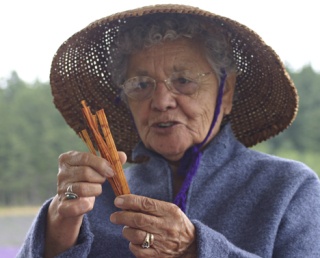The Lummi Arts Festival is Friday through Sunday, with events planned in three locations: The gallery on the corner of West and First streets, Dance Workshop II on Second Street, and the San Juan Historical Museum.
The events are free and open to the public.
Friday Harbor House has donated the use of the former gallery on West and First streets for an exhibit of works by artists from the Lummi Nation and from Turtle Mountain Chippewa. The range of artwork includes beadwork, carving in wood and bone, cedar masks, cedar baskets and cedar clothing, graphic arts, leatherwork, mixed media, photographic arts, quilting, sculpture, silverwork, and willow baskets.
Lummi artists scheduled to present: Shasta Cano-Martin, music and poetry; Ernestine Gensaw, cedar baskets and weaving/clothing; Earline Hansen, beadwork; Chrystal Jack, beadwork; Charles Miller, carving (masks); Yvonne-Thomas Miller, mixed media/painting; Mike Peters, graphic arts; Bruce Pierre, graphic arts/mixed media; Maxine Stremler, photography; Mike Thomas, carving (wood and bone); Lawrence Tom, graphic arts; and Clarissa Young, beadwork.
Turtle Mountain Chippewa artists scheduled to present: Alfred DeCoteau, stone and wood sculpture; Larry DeCoteau, painting and sculpture. Pati Kippen, ceramic/leather vases; Marcellino Parisien, sculpture; Sandra Parisien, beadwork and silversmith; Maureen Williams, quilting.
A performance arts event is scheduled Friday, 6:30-8 p.m., in Dance Workshop II.
Two presentations are scheduled Saturday, 6:30-8 p.m., at San Juan Historical Museum, 405 Price St.: “These Ancestral Islands: Oral History of the San Juan Islands,” and “Cultural Lifeways of the Turtle Mountain Reservation.”
Canoe Journey next week
Lummi, Nooksack, Samish, Suquamish, Swinomish and Tulalip canoes arrive in the San Juans en route to Duncan, B.C., as part of the 2008 Canoe Journey. Canoes will stop at Shaw Island on July 24 and Roche Harbor on July 25.
The Canoe Journey is a cultural connection like no other: With the cedar, which for millennia has provided material for art, canoes, clothing, fishing nets and houses; with the water, the marine highway for coastal peoples since time immemorial; and with extended families across the Northwest Coast. It’s also an intense athletic event; some canoes travel for hundreds of miles to get to the final destination, and each puller has to be mentally, physically and spiritually disciplined.
At each stop along the Canoe Journey, the public can watch the colorful, soulful arrival of the canoes: Colorful, because each canoe and paddle is an elaborately carved work of art; and soulful, because many of the canoe families keep time to songs, which often come to them on the water.
On the shore, in keeping with tradition, canoe families ask permission — often in their own languages — to enter and leave each territory.
There will be a free community welcome dinner on July 25, 7 p.m. at Roche Harbor to welcome the canoe families. Volunteers are needed; call Stephanie Buffum-Field of Friends of the San Juans, 378-2319.
The Canoe Journey ends in the territory of the Cowichan First Nation, which also hosts the 2008 North American Indigenous Games.
‘People of the Cedar’ Saturday at English Camp
Richard Vanderway returns to the island with a collection of replica objects to provide a glimpse of Northwest Coast Indian culture Saturday, 2 p.m., in the English Camp barracks.
The program is free. A golf cart is available to transport physically challenged persons from the parking area to the barracks. Call 378-2902 or 378-4409 for access information.
Vanderway is the education coordinator for Bellingham’s Whatcom Museum, where he has been presenting the “People of the Cedar” for more than 30 years. This year marks his 13th anniversary of bringing the program to English Camp.
The program includes a demonstration of bentwood box salmon cooking.




